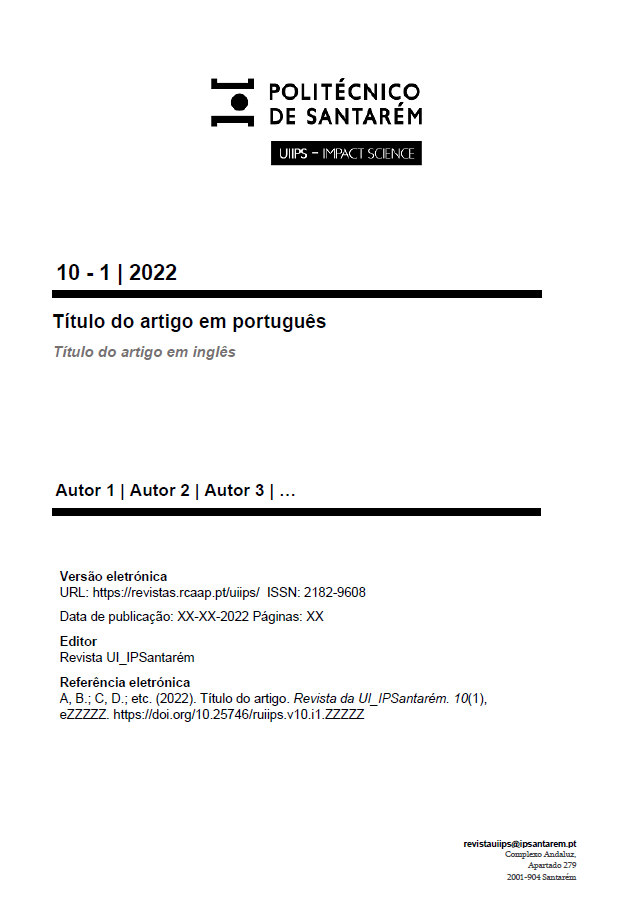The use of technologies in education from the cognitivist perspective of public schools
Social Sciences and Humanities
DOI:
https://doi.org/10.25746/ruiips.v10.i1.28824Keywords:
Cognitivismo, Aprendizagem, EducaçãoAbstract
The study points to a qualitative approach referring to a bibliographical study that consists in the observation of the cognitive learning theory at the Dom Constantino Luers State School, in the city of Campo Alegre – Alagoas. The observations contemplate the didactics of the Psychology in Education discipline, evidencing needs, changes, habits and management model that the observed school understands as necessary. Optimism and insistence on cognitive development are evident, bringing dynamics and methods that favor and encourage student permanence in school, advances in education, applied methodologies and the use of technologies as opportune and indispensable at the present time.
References
AUSUBEL, D. P. Aquisição e retenção de conhecimentos: uma perspectiva cognitiva. Lisboa: Plátano Edições Técnicas, 2003.
AUSUBEL, D. P. A aprendizagem significativa: a teoria de David Ausubel. São Paulo: Moraes, 1982.
AUSUBEL, D. P.; NOVAK, J. D. e HANESIAN, H. Psicologia Educacional. Rio de Janeiro: Editora Interamericana, 2 ª edição, 1980.
BRASIL. Instituto Nacional de Estudos e Pesquisas Educacionais Anísio Teixeira (Inep). Censo Escolar 2020. Brasília: Inep, 2020b. Disponível em: <http://idebescola.inep.gov.br/ideb/escola/dadosEscola/27041921>. Acesso em: 19 dez. 2021.
BRASIL. MEC/INEP. Relatório do Sistema Nacional de Avaliação da Educação Básica (SAEB) – ciclo 2019. Brasília, 2019. Disponível em: < https://novo.qedu.org.br/escola/27041921-escola-estadual-dom-constantino-luers/questionarios-saeb/alunos-3em >. Acesso em: 19 dez. 2021.
CUNHA, L. A. O Ensino de Ofícios nos Primórdios da Industrialização. 2.ed. São Paulo: Ed. UNESP, 2005.
ESCOLANO, Agustín. Arquitetura como programa: espaço-escola e currículo. In:VIÑAO FRAGO, Antonio; ESCOLANO, Agustín. Currículo, espaço e subjetividade: a arquitetura como programa. 2. ed. Rio de Janeiro: DP&A, 2001.p. 21-57.
FILHO.I. A. T. V., PONCE, R.F. ALMEIDA, S.H.V. As Compreensões do Humano para Skinner, Piaget, Vygotsky e Wallon: pequena introdução às teorias e suas implicações na escola. Psicologia. da Educação. São Paulo, 29, 2º sem. de 2009, pp. 27-55.
FREIRE, Paulo. Ação Cultural para a Liberdade: e outros escritos. 6 ed. Rio de Janeiro: Paz e Terra, 1982.
GHIRALDELLI JÚNIOR. Paulo. História da Educação brasileira. 5.ed. São Paulo: Cortez, 2015.
MACHADO, Lisandro Lemos. Informática educativa: elementos para uma proposta de formação continuada de professores. Passo Fundo: UPF, 2011. 150 p. Dissertação (Mestrado) - Programa de Pós-Graduação em Educação, Universidade de Passo Fundo, Passo Fundo, 2011.
MOREIRA, Antonio Flávio Barbosa; SILVA, Tomáz Tadeu. Sociologia e teoria crítica do currículo: uma introdução. In:MOREIRA, Antonio Flávio Barbosa; SILVA, Tomáz Tadeu da. Currículo, cultura e sociedade.12. ed. São Paulo: Cortez, 2011.p. 13-47.
PIAGET, J. Development and learning In: RIPLE R. e Rockcastle U. Ithaca Piaget Rediscovered. Nova York: Cornel University Press, 1964.p. 7-20.
PIAGET, J. Seis estudos de psicologia. Rio de Janeiro: Forense Universitária, 1999.
PIAGET, J. Epistemologia genética. 3. ed. Martins Fontes: São Paulo, 2007.
SÁ, M.; SANTIN FILHO, O. Alguns Aspectos da Obra de Piaget e sua Contribuição para o Ensino de Química. Revista Ibero-americana de Estudos em Educação, Araraquara, v.12, n.1, p. 190-204, 2017. Disponível em: E-ISSN: 1982-5587
REGO, T. C. 1999. Vygotsky: uma perspectiva Histórico-Cultural da Educação. Rio de Janeiro, Vozes, 138 p.
VALENTE, José Armando. Formação de educadores para o uso da informática na escola. Campinas: NIED/Unicamp, 2003.
VYGOTSKY, L. S. 1984. A Formação Social da Mente. São Paulo, Martins Fontes, 132 p.
VYGOTSKY, L. S. 1987. Pensamento e Linguagem. São Paulo: Martins Fontes, 157 p.
Downloads
Published
How to Cite
Issue
Section
License
Copyright (c) 2022 Jefferson de Oliveira

This work is licensed under a Creative Commons Attribution-NonCommercial-NoDerivatives 4.0 International License.
Authors publishing in this journal agree to the following terms:
Authors retain copyright and grant the journal the right of first publication, with the article simultaneously licensed under the Creative Commons Attribution License that allows sharing of the work with acknowledgement of authorship and initial publication in this journal.
Authors are permitted to enter into additional contracts separately for non-exclusive distribution of the version of the article published in this journal (e.g., publish in an institutional repository or as a book chapter), with acknowledgment of authorship and initial publication in this journal.
Authors have permission and are encouraged to publish and distribute their work online (e.g., in institutional repositories or on their personal webpage) at any point before or during the editorial process, as this may generate productive changes, as well as increase the impact and citation of the published work.





